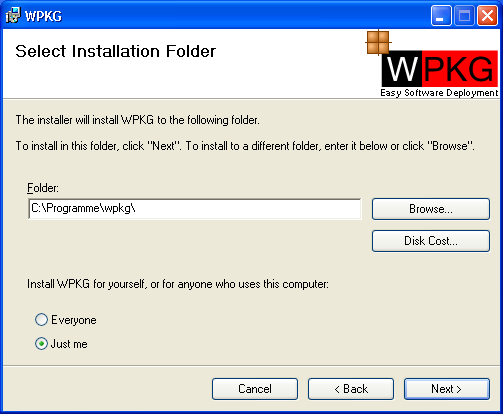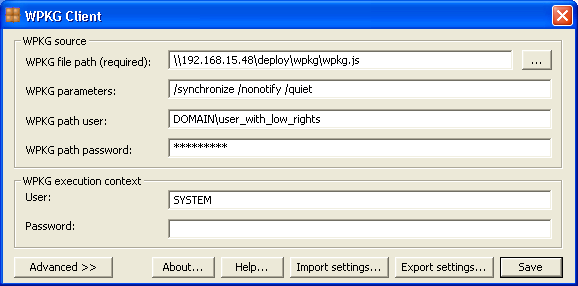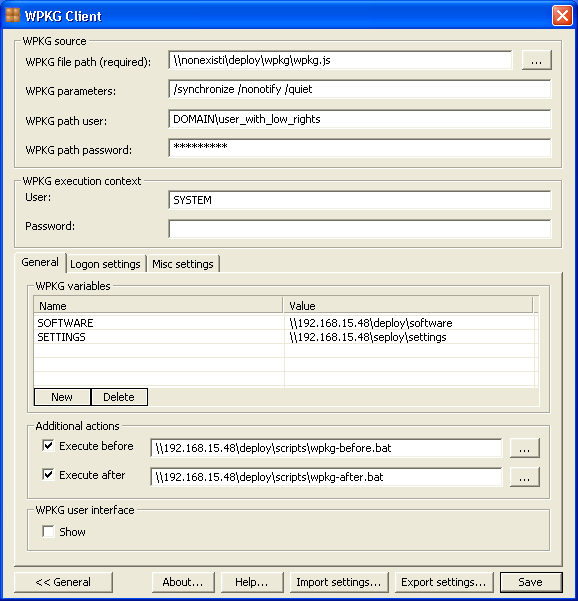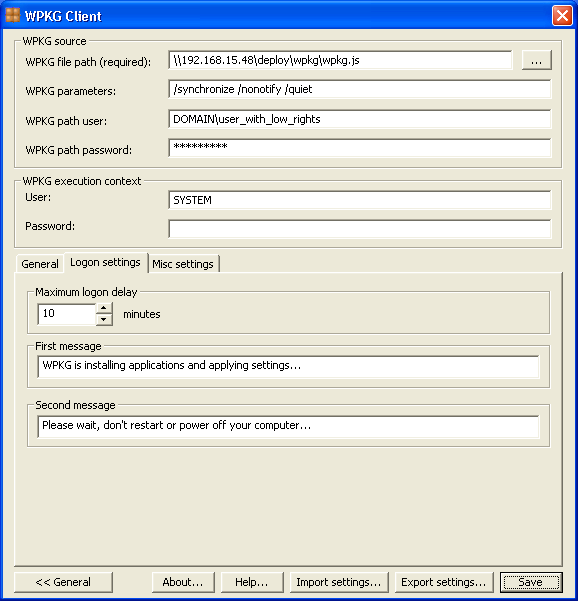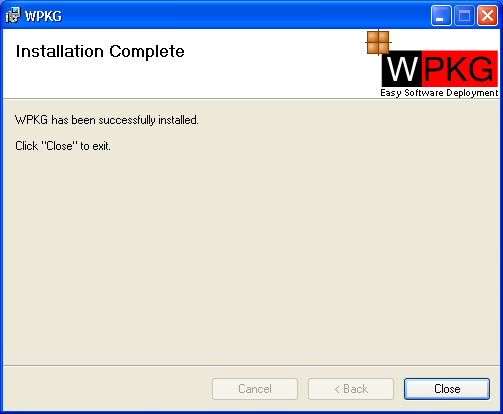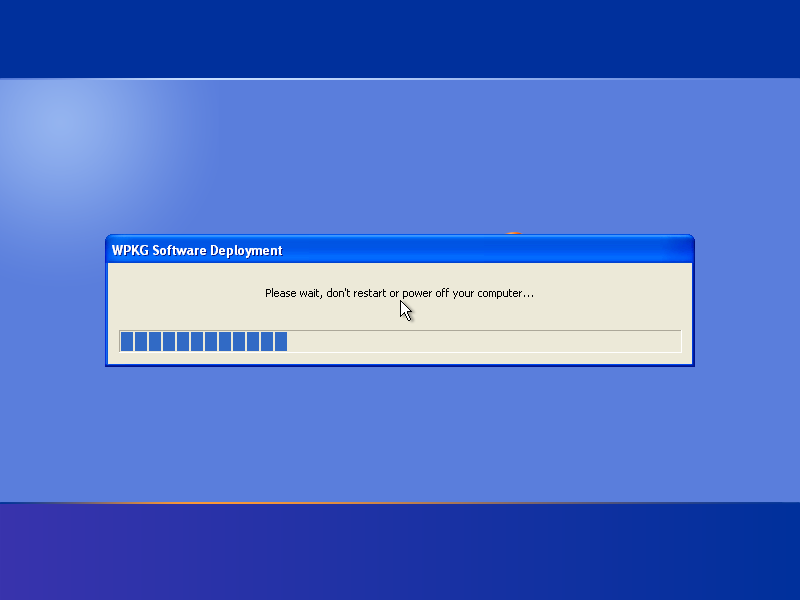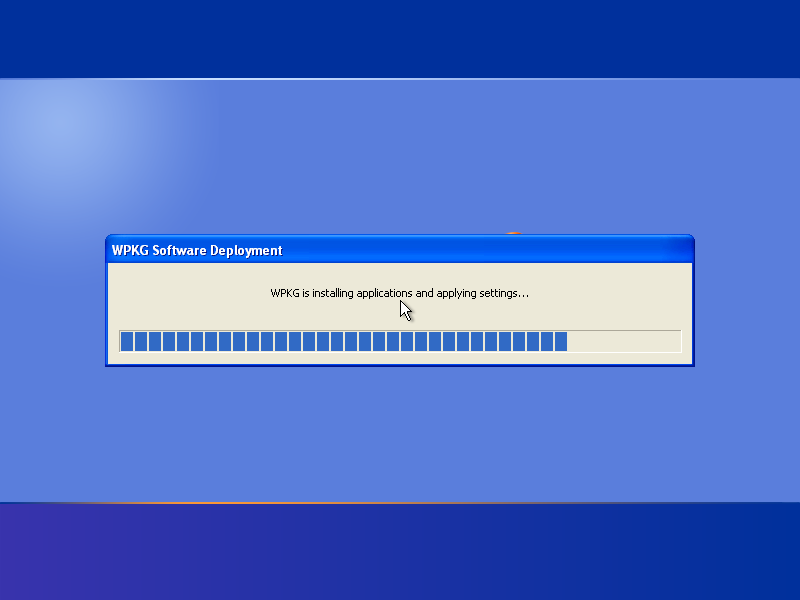Screenshots
Contents
Installation
GUI / graphical client installation mode
The WPKG Installer will create a windows service on the client machine. The service will run at system boot, and read the configuration xml files from the WPKG network share. The service will be created to run as the local SYSTEM user (the other user credentials discussed below are different).
As an administrator, we run setup.exe, and choose where WPKG should be installed...
And then, we configure its parameters (see: WPKG_Client_-_GUI_help for a detailed description of settings) ...
The "WPKG path user" credentials are used to gain access to the network share where the wpkg.js script and the configuration xml files are located. A directory to hold installation files is often also placed in the same share, as shown in the example below. If the share is set up to accept guest read access from anyone, then these credentials may not matter.
The "WPKG execution context" user is the user that "executes all commands". This user probably has to have administrative privileges on the local machine to be able to do most interesting installs. By default, WPKG Client sets this to SYSTEM (no password needed), which is a recommended and secure setting. If your software vendor ships installers which fail to install as a SYSTEM user (i.e., have a hardcoded check to see if they are started as an Administrator), you may consider using a local or a domain Administrator credentials here. Also, if any of your installation scripts require access to network shares (other than the share where the script and configuration files are) then you can set this to a user that has administrative privileges on the local machine and also read (or read/write) privileges on the necessary network shares.
NOTE: unless you understand Windows networking very well, using one single share for both software (installers) and WPKG (wpkg.js, config.xml, package definitions) is the recommended one.
Next we set some advanced settings.
Setting "Show" in "WPKG user interface" is only needed if we want to see the installers working in the foreground - it's good for debugging.
When the "Show" option is disabled, the installers will execute in the background - recommended for normal usage (normal users shouldn't interact with installers).
Next, you can change logon settings - it is possible to delay user logon when applications are installing.
Of course, if applications are installed faster than the delay we specified, the user is not unnecessarily delayed.
Additionally, the messages seen by the user can be changed with a custom message in any language.
You can export all settings with "Export settings" - if you intend to script / automate the installation.
After that, installation and configuration on the client is complete!
Reboot the machine to start the service and see if it correctly finds the configuration files and so forth. Check the Windows Events log for details of its actions.
You can later change the parameters by running "WPKG Parameters" shortcut placed on Administrator's desktop.
CLI / command line mode
You can also install WPKG from command line - for scripted, silent/unattended installation.
Use this one for initial deployment:
msiexec /qb /i WPKGSetup.msi SETTINGSFILE=\\server\deploy\settings\settings.xml ALLUSERS=1
it is important to set the ALLUSERS variable, or at the first wpkginst run the permisisons/ACL of the folder %PROGRAMFILES%\WPKG will be totally blanked preventing the wpkg service to run at next boot.
And this one if you want to update settings:
"%PROGRAMFILES%\WPKG\wpkginst.exe" --SETTINGSFILE=\\server\deploy\settings\settings.xml
You can generate the settings.xml file by pressing the "Export settings..." button (see screenshots above).
Notes:
- Filenames surrounded with quotes will not work in current version (1.2rc6)
- Command line options for import/export of settings in 1.2rc6 are different
--import=\\server\deploy\settings\settings.xml --export=%PROGRAMFILES%\Wpkg\exported-settings.xml
Usage
Windows XP
WPKG starts when the system starts.
It can start all the programs/installers totally in the background (recommended), or in the foreground (not recommended for normal usage, as users can interact with the installers; only recommended for debugging).
Logon can be delayed until all applications are installed.
Applications are being installed in the background.
Messages appearing can be localized.
Here, a Windows XP system that is not a part of a domain.
Windows Vista
In Windows Vista, delayed login is unavailable owing to the way Windows Vista's security architecture is structured. To find out if WPKG did start successfully, you can check the Event Viewer(Local) > Windows Logs > Applications. You will find under Source > WpkgService appropriate logs pertinent to WPKG. You can also set appropriate variables in config.xml to write a custom log based on the level of granularity desired.
Alternatively try looking at the WPKG-GP client that reportedly uses Group Policy Extensions to work properly in Vista & Windows 7.
